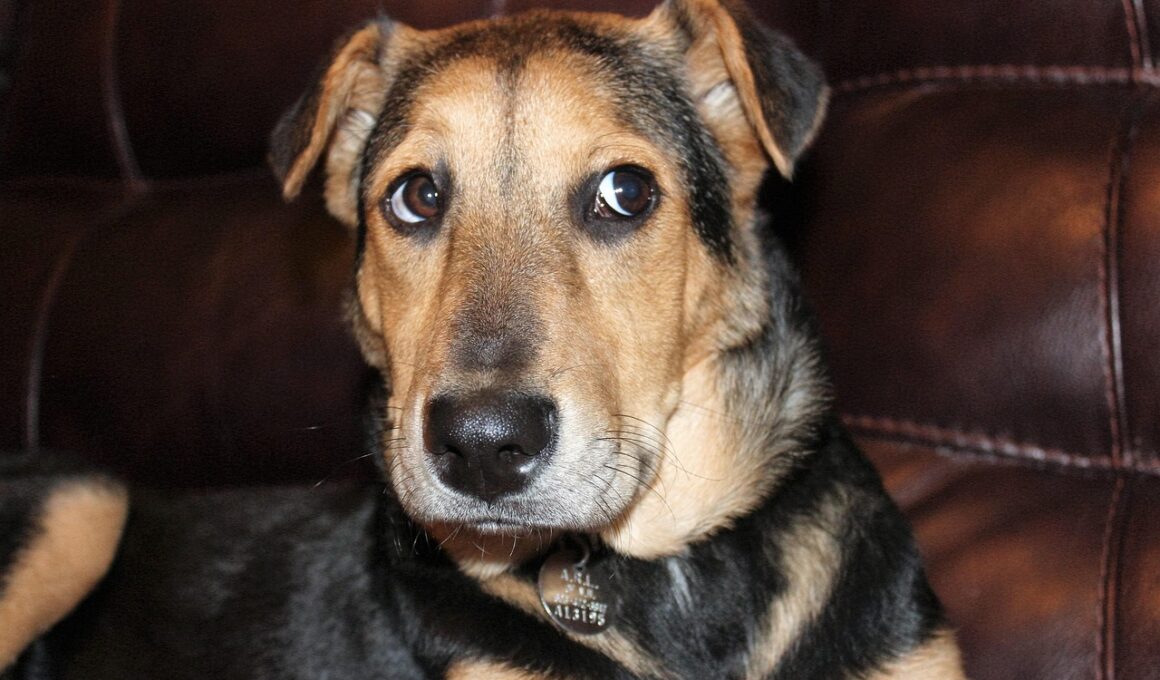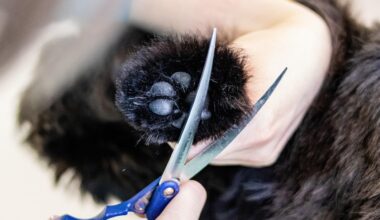Puppy Socialization Strategies for Rescue Dogs
Socializing rescue dogs is crucial for their adjustment to new environments. Start by gradually introducing them to various stimuli, environments, and people. Begin in a quiet place where they feel safe, and then gradually expose them to busier settings. This ensures they receive positive reinforcement without feeling overwhelmed. Encourage interactions with friendly dogs, but supervise closely. Establish a consistent routine for socialization exercises to create familiarity. Keep sessions short and sweet to avoid fatigue. Use treats to reward calm behavior and reinforce positive associations. Always observe your pup’s body language, as it provides insights into their comfort levels. Short, frequent socialization outings are more effective than long sessions. Prioritize quality over quantity when it comes to social interactions. Consider engaging them in structured activities like obedience classes or agility sessions. Look for local puppy kindergarten opportunities, which are an excellent way to expose them to other dogs and people. Finally, patience is key, as some rescue dogs may take longer to adapt than others. Consistently guide them through the process to facilitate their comfort and confidence.
Understand the importance of early socialization for Rescue Dogs. Early exposure to diverse environments shapes a dog’s personality and behavior. Socialization occurs during a critical period, usually within the first 16 weeks. During this time, puppies are more open to new experiences, which will help reduce anxiety once they reach adulthood. When rescuing a puppy, try to ensure they have positive encounters with various people, animals, and stimuli in a safe manner. Incorporate socialization slowly to help them acclimate to new surroundings and experiences effectively. Understanding their unique history can help tailor socialization strategies. Some rescue dogs might have experienced trauma, making them more timid. Listen actively to your dog’s signals and respect their comfort zone. Gradually introduce them to new sights, sounds, and smells in a controlled manner. Use positive reinforcement techniques such as praise and treats when they experience new situations calmly. This helps build their confidence and fosters a positive attitude. Consult with a professional trainer or behaviorist during tough transitions, as they can provide guidance tailored specifically to your rescue dog’s needs, ensuring a smooth socialization process.
Engaging Interaction Techniques
Utilizing engaging interaction techniques can significantly enhance a rescue puppy’s socialization experience. Start introducing your dog to different people, both adults and children, in various settings. This helps the puppy learn to adapt to different energies and personalities. Always supervise interactions, ensuring they remain positive. Emphasize gentle introductions, allowing the dog to approach at their pace while being encouraged through treats and friendly gestures. Use toys to facilitate play and interaction with other dogs. Observe their responses during playtime to gauge their comfort levels. If they seem overwhelmed, create space and allow them to relax. Group classes offer supervised environments where rescue dogs can learn social skills alongside others. Look for classes that focus on socialization, allowing them to acclimatize gradually. Remember to practice patience, as some dogs may require additional time to adjust. Acknowledge their efforts and celebrate small victories during playdates or training sessions. Include fun activities in your schedule, such as nature walks, thus exposing them to various environments, promoting adaptability. The more experiences you provide, the more confident your dog will become in social situations, leading to a well-adjusted adult.
Establishing a solid foundation of trust with your rescued puppy is key. This foundation enables them to feel safe and secure, making socialization easier. Spend quality time every day through bonding activities, like gentle grooming and interactive play. Build their confidence incrementally by rewarding them for brave behaviors, such as approaching new people or exploring unfamiliar places. Avoid forcing interactions; allow them to take the lead in approaching new situations. Ensure a safe and controlled environment by using crates or gated areas. This can provide a comforting retreat for the puppy when feeling overwhelmed. Incorporating positive experiences with gradual exposure is essential for your dog’s development. Acknowledge each step taken during socialization to reinforce positive behavior. Regularly expose them to different environments ranging from parks to cafes, reinforcing their adaptability to new spaces. Practice basic commands in these environments to help create a sense of security through structure and routine. Gradually challenge them with diverse surroundings, always respecting their pace. This consistent exposure will enhance their social skills and help alleviate fears, cultivating a balanced, confident dog who thrives in various social settings.
Utilizing Leash Training
Implement leash training as a fundamental aspect of socialization for rescue dogs. Proper leash handling helps in guiding your puppy through new experiences. Start with short walks in familiar areas before venturing into busier environments. Use treats, praise, and encouraging words to motivate your puppy as they walk beside you. Focus on creating a loose leash when walking. If your dog pulls or reacts negatively, calmly redirect them into a more positive behavior. Gentle corrections can avoid reinforcing anxiety. Practice leash training consistently, as this builds confidence over time. Utilize leashes with appropriate lengths and find equipment that suits your dog’s size and breed. Explore harnesses as an alternative, especially for puppies requiring a secure yet gentle approach. As your pup’s confidence increases, introduce them to different situations, such as crowded places. These experiences, while maintaining control through leash training, can result in positive engagement. Encourage your dog to calmly observe their surroundings without overwhelming them. Gradually lengthen your outings to enhance their socialization opportunities. Consistently using positive reinforcement will help them learn to enjoy distractions and experiences from their surroundings, building optimism.
Incorporate training games into your puppy’s socialization process. Training games stimulate interaction while building their confidence in various environments. Focus on simple commands like ‘sit’ and ‘stay’ that can be practiced in diverse settings. Reward your puppy with treats for compliance, which fosters a desire to engage. Gradual exposure in varying settings will enhance their comfort as they progress. You can introduce new elements, such as toys that represent different stimuli, or interactive puzzles that require problem-solving skills. Look for opportunities to socialize in safe settings where friendly dogs and people interact. Schedule playdates or local dog park visits, ensuring your puppy is greeted politely. Observe how your dog reacts to the engagement and provide guidance as needed. Use socialization tools at home for practicing recall and engagement. Socialization should be a fun experience that creates positive associations. Regular training sessions, along with social activities, will gradually expose your puppy to diverse elements. This promotes adaptability and a well-adjusted temperament. Engage with your puppy routinely to reinforce socialization strategies. Over time, these games will greatly benefit their ability to socialize effectively.
Seeking Professional Assistance
When encountering difficulties, seeking professional assistance can be a game-changer in your puppy’s socialization journey. Professional trainers are invaluable resources offering guidance tailored to the unique needs of rescue dogs. They can provide support and insights tailored specifically for your puppy’s challenges. Consider enrolling in classes or workshops led by experienced trainers focused on socialization for rescued animals. These classes typically incorporate a variety of environments, teaching skills in a cooperative setting with other dogs and people. Look for trainers with certifications in dog behavior or training methods, ensuring they adhere to positive reinforcement principles. Implementing their techniques can yield impressive results when integrated into your training schedule. Additionally, many trainers offer private consultations to address more specific concerns. This personalized approach ensures you receive timeless knowledge and effective strategies. Create a training plan that balances exposure to diverse experiences with structured learning. Remember, socializing a rescue dog often involves consistent effort and modifications, so it is essential to be patient. Engaging professionals can make the journey smoother, ultimately leading your puppy towards becoming a well-adjusted, sociable companion.
Reflect on the overall experience of socializing a rescue dog. This process is as much about building a bond as it is about introducing your puppy to the world. It requires understanding, communication, and consistent dedication. Document your puppy’s progress over time, identifying milestones and highlights in their development. This can be motivating and provide valuable data for celebrating achievements. Celebrate the small victories alongside your puppy, emphasizing positive feedback throughout the journey. Remember the importance of consistency in training and socialization techniques, as this will solidify what they learn. Your commitment to socializing them enriches their life and enhances your bond. Understand that setbacks may occur, and providing support during these times fosters trust. As your puppy grows and becomes more socially adept, embrace new opportunities for training and exploration. Build on their successes, fostering an engaging atmosphere for continued learning. Finally, always prioritize your puppy’s well-being and happiness as they discover their new life with you. With patience and love, you can create an enduring companionship that significantly enriches your lives and strong social skills for navigating the world.


